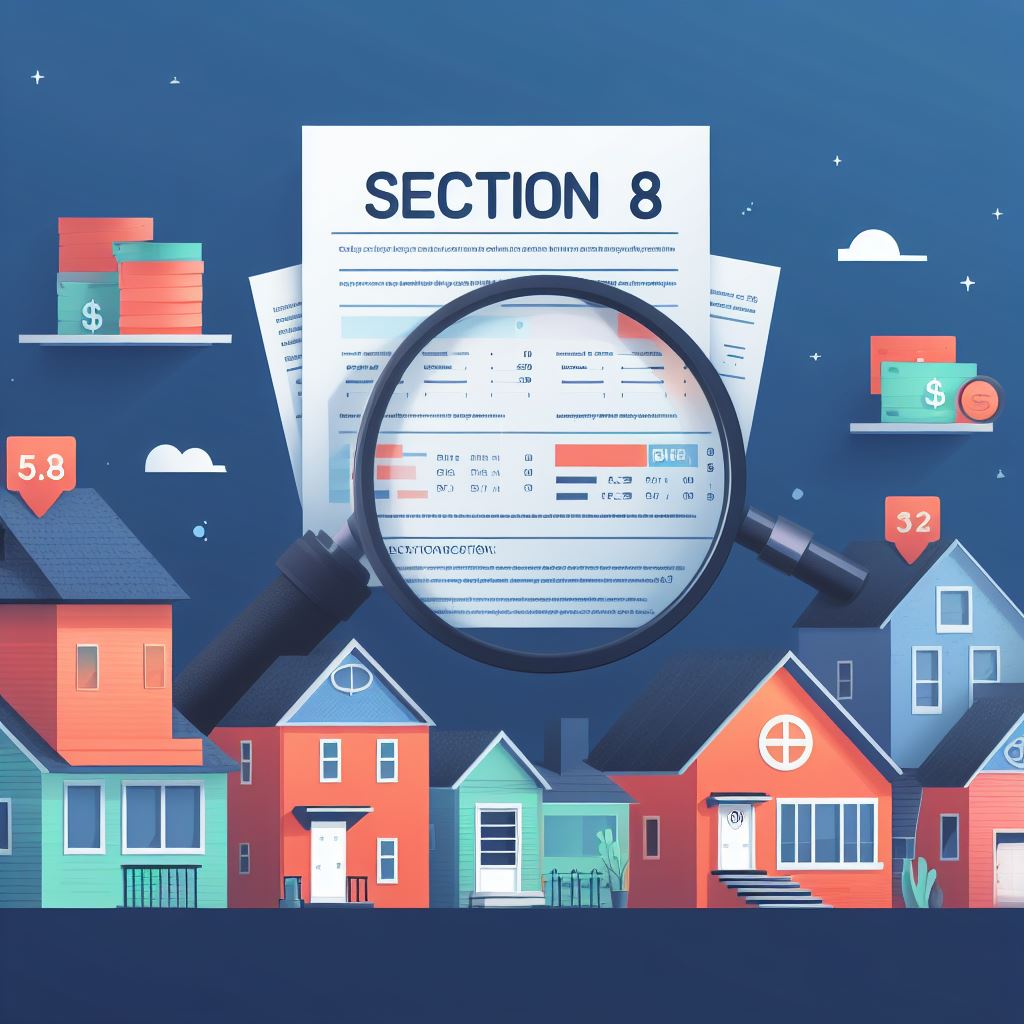Decoding Section 8 Housing: Income Eligibility Explained

You’re about to embark on a journey to decode the mysterious realm of Section 8 housing. Brace yourself as we delve into the intricate details of income eligibility.
You’ll discover the factors that determine your eligibility and learn how to calculate your total household income. But wait, there’s more!
We’ll also explore exceptions and special considerations that might affect your chances. So grab a cup of coffee and get ready to unravel the secrets of Section 8 housing.
Key Takeaways
- Section 8 Housing, also known as the Housing Choice Voucher Program, helps low-income individuals and families afford safe and decent housing.
- Participants receive rental assistance through vouchers and can choose their own housing in the private market.
- HUD sets income limits based on the area’s median income (AMI), and all sources of income are considered.
- Factors such as household size, housing needs, rental history, and waiting lists may affect eligibility for Section 8 Housing.
Understanding Section 8 Housing
To understand Section 8 Housing, you need to know how it works and what it offers. Section 8 Housing, also known as the Housing Choice Voucher Program, is a federal assistance program designed to help low-income individuals and families afford safe and decent housing. It provides rental assistance to eligible participants, allowing them to choose their own housing in the private market.
The program works by providing vouchers to eligible individuals and families, who then find a unit that meets the program’s requirements. Once a suitable unit is found, the program pays a portion of the rent directly to the landlord on behalf of the participant. The participant is responsible for paying the remaining portion of the rent.
Section 8 Housing offers numerous benefits. It helps to alleviate the burden of housing costs for low-income households, allowing them to have more financial stability. It also provides access to safe and decent housing options, ensuring that participants can live in neighborhoods that meet their needs.
Understanding how Section 8 Housing works is essential in order to fully comprehend the income limits and guidelines that determine eligibility. These limits and guidelines are set by the Department of Housing and Urban Development (HUD) and vary based on factors such as family size and location.
Income Limits and Guidelines
To determine if you meet the income eligibility requirements for Section 8 Housing, you must understand the income limits and guidelines set by the Department of Housing and Urban Development (HUD). These limits and guidelines are designed to ensure that the program benefits those who truly need assistance. Here are the key things you need to know:
- Income Limits: HUD sets income limits based on the area’s median income (AMI). These limits vary depending on the size of your household. To qualify for Section 8, your household income mustn’t exceed a certain percentage of the AMI.
- Income Sources: HUD considers all sources of income when determining eligibility. This includes wages, Social Security benefits, child support, and any other regular income. Some types of income, such as certain disability benefits, may be excluded or have special rules.
- Asset Limits: While there’s no specific asset limit for Section 8, HUD does consider your assets when determining eligibility. However, certain assets, like your primary residence and retirement accounts, are generally excluded.
- Income Recertification: Once you’re approved for Section 8, you’ll need to recertify your income regularly. This ensures that you still meet the income eligibility requirements. Failure to complete the recertification process may result in the termination of your benefits.
Understanding the income limits and guidelines is essential to determining your eligibility for Section 8 Housing. By familiarizing yourself with these requirements, you can better navigate the application process and secure the assistance you need.
Factors Affecting Eligibility
Factors that can affect your eligibility for Section 8 Housing include your household size, housing needs, and rental history. These factors play a crucial role in determining whether you meet the requirements for the program.
Firstly, your household size is an important consideration as it determines the number of bedrooms you’re eligible for. The program aims to provide adequate housing for families, so larger households may have a higher chance of eligibility.
Secondly, your housing needs are taken into account. This includes factors such as accessibility requirements, medical conditions, and whether you have any special needs that necessitate specific housing features.
Lastly, your rental history is assessed to determine if you have a reliable and responsible track record as a tenant. This involves looking at your payment history, any evictions or lease violations, and overall rental behavior.
It’s important to note that meeting these eligibility factors doesn’t guarantee acceptance into the Section 8 Housing program, as there may be additional criteria and a waiting list to contend with.
Calculating Total Household Income
When calculating your total household income for Section 8 Housing, it’s important to consider all sources of income. This will ensure an accurate assessment of your eligibility for the program. Here are four key items to include when calculating your total household income:
- Employment Income: Include wages, salaries, tips, and any other income earned from employment. Don’t forget to account for any overtime or bonuses received.
- Self-Employment Income: If you’re self-employed, include your net income after deducting business expenses. This can include income from freelance work, consulting, or owning a small business.
- Social Security Benefits: Include any Social Security retirement or disability benefits received by any member of your household.
- Other Sources of Income: This category includes income from pensions, alimony, child support, rental properties, and any other regular sources of income.
By considering all these sources of income, you can accurately calculate your total household income for Section 8 Housing. It’s important to be thorough and provide all necessary documentation to support your calculations.
Now that you understand how to calculate total household income, let’s move on to the next section, which covers exceptions and special considerations.
Exceptions and Special Considerations
If you’re applying for Section 8 Housing, there are certain exceptions and special considerations that you should be aware of. While income eligibility is a crucial factor in determining your eligibility for Section 8 Housing, there are some exceptions that may apply.
If you’re a person with disabilities and are living in a group home or an institution, your income may not be counted towards the total household income. This is because Section 8 Housing recognizes that individuals with disabilities may have additional expenses related to their disability and therefore, their income shouldn’t be a barrier to accessing affordable housing.
Another special consideration is given to elderly individuals and disabled individuals who receive income from the Supplemental Security Income (SSI) program. The Department of Housing and Urban Development (HUD) has established a separate income limit for these individuals, which is typically lower than the standard income limits. This allows elderly and disabled individuals who rely solely on SSI to still be eligible for Section 8 Housing assistance.
It is important to note that these exceptions and special considerations may vary depending on your local housing authority and the specific regulations in your area. Therefore, it’s advisable to contact your local housing authority directly to get accurate and up-to-date information about any exceptions or special considerations that may apply to you.
Frequently Asked Questions
How Can I Apply for Section 8 Housing?
To apply for Section 8 housing, you’ll need to contact your local public housing agency. They will provide you with the necessary forms and guide you through the application process.
What Are the Benefits of Section 8 Housing?
Section 8 housing offers numerous benefits such as affordable rent, access to safe and decent housing, and the opportunity to improve your financial situation. These benefits can be life-changing for individuals and families in need.
Are There Any Additional Expenses I Need to Consider When Living in Section 8 Housing?
When living in Section 8 housing, there may be additional expenses to consider. These can include utilities, renter’s insurance, and any costs not covered by the program. It’s important to budget accordingly to ensure financial stability.
Can I Transfer My Section 8 Voucher to a Different State?
Yes, you can transfer your Section 8 voucher to a different state. However, there are certain requirements and procedures you must follow. Contact your local housing authority for more information on how to initiate the transfer.
What Happens if My Income Increases While I Am Receiving Section 8 Assistance?
If your income goes up while receiving Section 8 assistance, your housing agency will recalculate your rent. You may have to pay a higher portion of the rent, and the subsidy amount may decrease.



